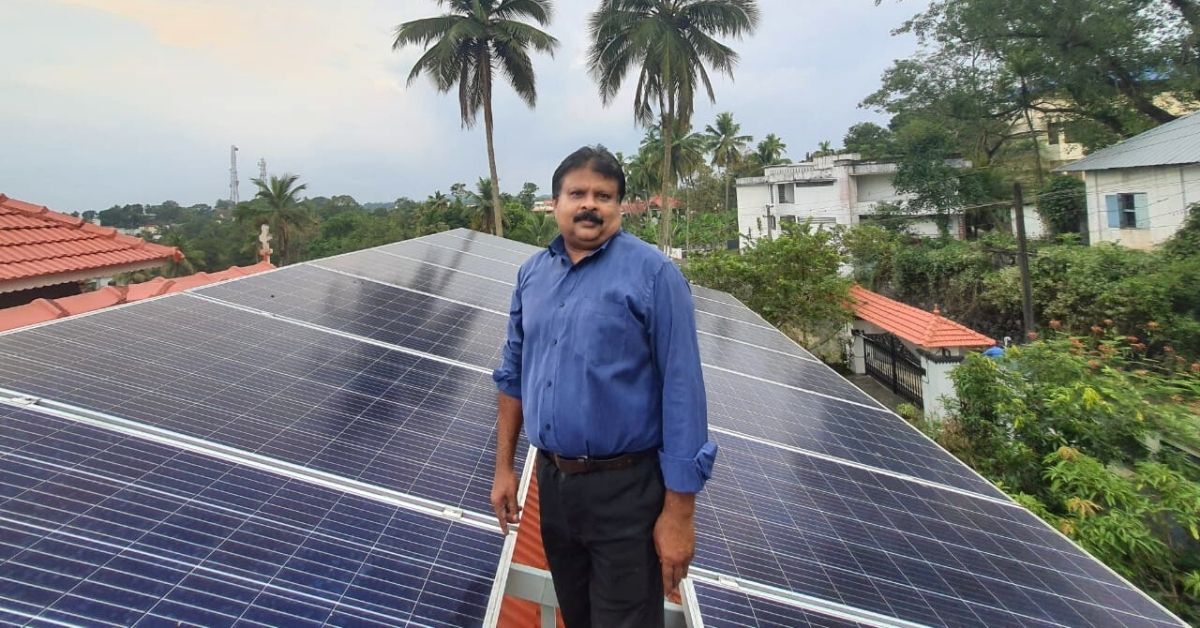Despite Owning an Electric Car, This Kerala Doctor Reduced His Power Bill by 96%
Jojo John, an anaesthetist from Kochi in Kerala, narrates how his switch to solar energy reduced his electricity bills from Rs 4000 to Rs 140 and switching to a solar-powered electric vehicle brought his fuel costs down to zero

There could be a plethora of reasons that motivate an individual to move towards a sustainable way of life. For Jojo John, resident of Kochi, Kerala, it was a headline about the United Kingdom banning fuel vehicles by 2030. Fascinated by how an entire country would switch to alternate modes of transportation, he decided to buy an electric car and even power his house with solar energy.
“My electricity bill was soaring and reached Rs 4,000 a month during the summer season. So, I installed solar panels in January 2020 to power the appliances of daily use. I was also contemplating buying an electric car as I realised that installing solar panels could power an electric vehicle as well. Thinking ahead, my electric car powered by solar energy could reduce pollution and also cover the recurring fuel costs behind it,” Jojo explains.
Jojo, an anaesthetist at a government hospital, adds that he chose to install a 5 Kw solar powered system for Rs 3.25 lakh and synchronised it with the Kerala Electricity Board grid. The doctor bought a Tata Nexon EV in June 2020, and claims that not only his car but also all the appliances in his house get powered by solar energy as well.
Going Off The Grid

“I calculated that the fuel costs for driving the car are about Rs 8 per km. Using electricity from the grid to charge the electric car would cost between 50 paise and Re 1. But if I used solar energy to charge the vehicle, the cost would come down to zero. The battery life of the car is eight years, with no maintenance costs. The move makes it a very economical prospect,” Jojo adds.
The solar panels, he says, generate about 30 units of power in a day and his car requires 25 units of electricity for a full charge. “It does not require me to charge the car daily for my commute to the city. The air conditioner, refrigerator, washing machine, CCTVs, microwave and television all run on solar power. However, during monsoon or cloudy days, I use the electricity from the grid,” he adds.
Akil Alex, the founder of Solar Kart, the company that installed the solar panels at Jojo’s house, explains, “The solar panels generate 4,000 watts in a day, and Jojo’s requirements are about 2,000 watts. The excess electricity, if unused, returns to the grid. When the solar panels generate less power on a cloudy day, say, for example, 500 watts, his house can use the electricity from the grid to satisfy power needs.”
Speaking to The Better India, the doctor says in the past one year he has hardly paid Rs 70 to Rs 140 (during summer months) to the power utility company for his electricity usage from the grid.
Jojo says using solar panels has relieved him of the guilt of using electricity generated from coal. “I researched, referring to journals and papers, for three months to understand and calculate all the dynamics before making the decision. No one in Kochi had done this before, and it became difficult to get things right with no reference at hand. But now I am satisfied with the results,” he adds.
Jojo says that it would be better if there were more charging stations across the country to allow for longer road trips in eco-friendly vehicles.
Taking cue from Jojo
Watch Jojo explaining Akil how the solar initiative helped him economically.

Akil says that he received over 200 calls after Jojo’s initiative of operating his house and car on solar power went viral on social media.
Priyadarshini Karve, executive member of Indian Network on Ethics and Climate Change (INECC) says that charging electric vehicles from renewable energy is the correct path for using clean energy.
“Electric vehicles often get charged from the electricity generated by burning fossil fuel like coal so this only marginally serves the purpose of using clean energy. The carbon emissions by electric vehicles might be zero at a traffic signal or during the commute. However, it is still responsible for a percentage of carbon emissions, as often the electricity used to charge the battery comes from the burning of coal or fossil fuel,” Priyadarshini says.
The expert adds that electric vehicle users should take a cue from Jojo. “Only by using a renewable form of energy to charge electric vehicles will help mitigate the greenhouse gases and fight climate change in a true sense,” she says.
If you found our stories insightful, informative, or even just enjoyable, we invite you to consider making a voluntary payment to support the work we do at The Better India. Your contribution helps us continue producing quality content that educates, inspires, and drives positive change.
Choose one of the payment options below for your contribution-
By paying for the stories you value, you directly contribute to sustaining our efforts focused on making a difference in the world. Together, let’s ensure that impactful stories continue to be told and shared, enriching lives and communities alike.
Thank you for your support. Here are some frequently asked questions you might find helpful to know why you are contributing?


This story made me
-
97
-
121
-
89
-
167













